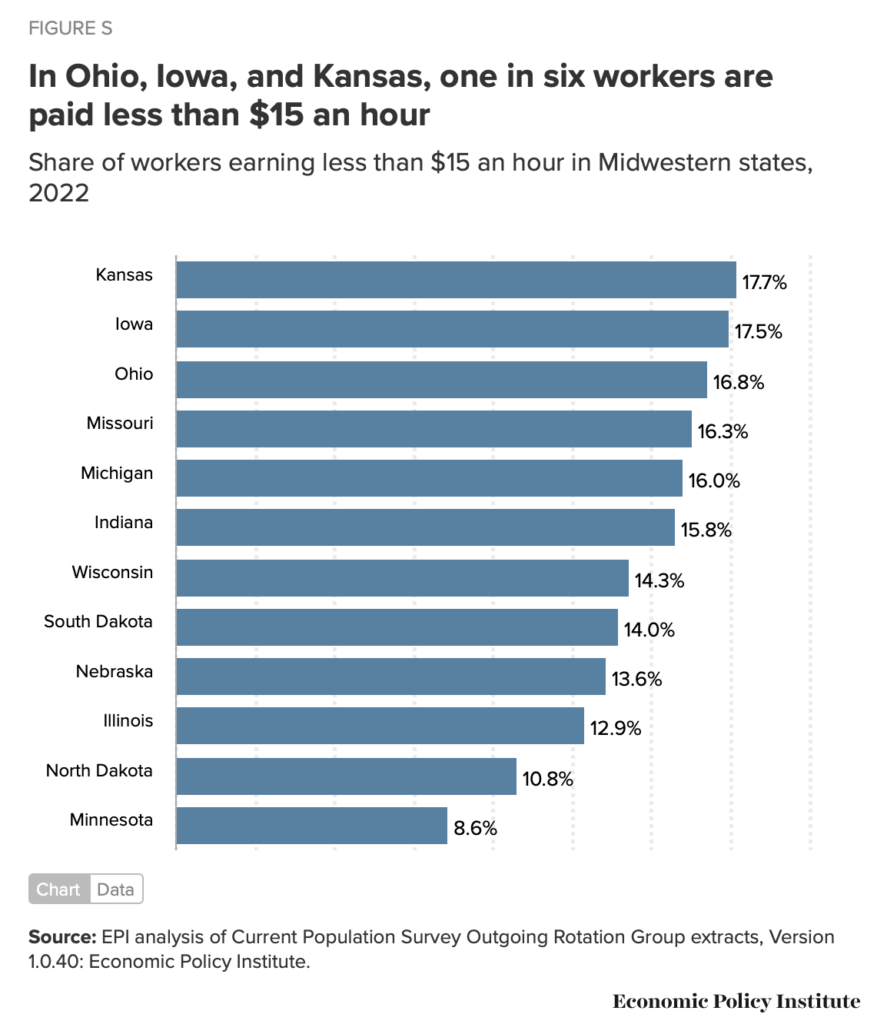A new Economic Policy Institute analysis showing that the Midwest is lagging the rest of America in economic recovery from the pandemic notes that Midwestern states have followed a national trend in reducing the percentage of workers making less than $15 an hour. Among Census-defined Midwestern states, South Dakota has the fifth-lowest percentage of workers earning less than $15 an hour; Minnesota has the lowest percentage in the region:

Raising and indexing our minimum wage in 2014 likely helped.
| State | workers under $15/hour | minimum wage |
| Kansas | 17.7% | $7.25 |
| Iowa | 17.5% | $7.25 |
| Ohio | 16.8% | $10.10 |
| Missouri | 16.3% | $12.00 |
| Michigan | 16.0% | $10.10 |
| Indiana | 15.8% | $7.25 |
| Wisconsin | 14.3% | $7.25 |
| South Dakota | 14.0% | $10.80 |
| Nebraska | 13.6% | $10.50 |
| Illinois | 12.9% | $13.00 |
| North Dakota | 10.8% | $7.25 |
| Minnesota | 8.6% | $10.59 |
Four of the five Midwestern states that still follow the federal minimum wage of $7.25 an hour have higher percentages than South Dakota of workers making less than $15 an hour.
Thanks to the voter initiative approved in 2014, South Dakota’s minimum wage will increase 5.5% on January 1, 2024, to $11.20 per hour.
I was surprised to see that SD minimum wage is greater than Minnesota’s.
jkl, of course Minnesota’s minimum wage is for ALL employees – including the “tipped” employees that SD’s doesn’t cover.
I am in the process of starting a new division for the Minnesota and SD-based business that is my employer, and have been doing some investigation of prevailing wages for federally funded jobs in the various states we work in. It seems nationwide, Minnesota trails only Maine and Oregon in the job titles I’m looking at adding.
Richard Schriever, thanks for the additional info.
I now live in a place where the Building Trades and Laborers Union, along with Stationary Engineers, Teamsters, Warehousemen, Steel Workers, Railroad Brotherhoods, and Great Lakes sailors set a high standard for worker’s wages. The standard of living for these folks is good but expensive to maintain and many of these jobs can be seasonal. There is an underclass of poor, mostly unemployed people who have been marginally employed, but “getting by”, for generations. It turns out that employment in the union trades is largely familial. Guys tend to work where there father’s and grandfathers worked. It’s an accepted hierarchy system for folks who labor for a living at physically taxing, well paying jobs. A fellow is born into his position.
Indeed, Mr. Blundt, a fellow is often born into his position.
Indeed….Grudznick